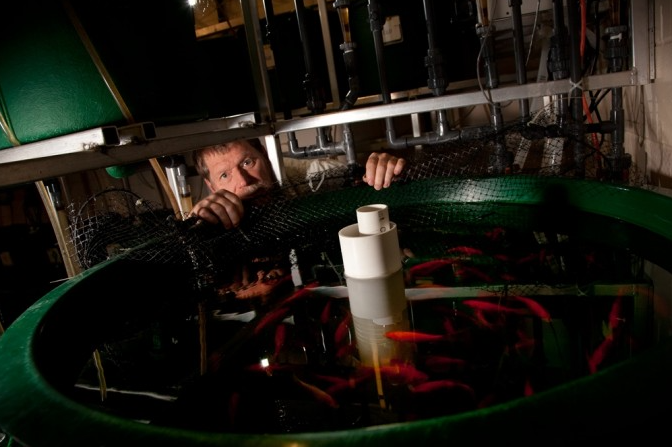
Newsroom
Fishing for a Solution
Behind the fish tank: Vance Trudeau. Photo: uOttawa

How do you build a sustainable food supply for more than a billion people? This is the monumental challenge faced by scientists in China.
At the Chinese Academy of Sciences’ facility in the city of Wuhan, a team of biologists from the Institute of Hydrobiology (IHB) is working on ways to increase the production of fish for food. And this team is turning to the University of Ottawa’s Department of Biology to better understand the underlying factors that affect the reproduction, development and stress of farm-raised fish.
The IHB is a biotechnology powerhouse and is particularly interested in uOttawa’s expertise in the hormones that control fish reproduction and growth. Biology professor Vance Trudeau, known internationally for his work on fish and frog neurobiology and for developing a synthetic hormone mixture to breed frogs in captivity, is the University of Ottawa’s lead investigator in a new research partnership with IHB, which was signed in October.
In the long term, this research aims to better control reproduction in different fish species and to produce fish that grow faster but do not reproduce at all. “One way is to identify the genes controlling reproduction, growth and responses to environmental change, then use genetic and molecular tools to produce these fish,” explains Trudeau. “In this way, species kept specifically and securely on fish farms would not be able to breed with wild fish. This would avoid any issues associated with genetically modified fish affecting local fish populations because they cannot reproduce on their own but they grow well.”
IHB scientists are also interested in the University of Ottawa’s world-class research on the effects of pollutants on the aquatic environment, adds Trudeau.
The pairing of “the strongest group of aquatic biology researchers in China and, arguably, the strongest group of fish physiologists in Canada will create the foremost centre of its kind in the world,” says Steve Perry, dean of the Faculty of Science. "It will catapult us to another level that would be unachievable otherwise.”
In addition to joint research projects, this collaboration will promote the mobility of professors, doctoral students and postdoctoral fellows between the two institutions, facilitate the organization of an annual symposium on fish and aquatic physiology, and generate external research funding. Two symposia have already been held: one at IHB in 2013 and the other last month at uOttawa. The partners also plan to establish a joint research centre that will provide students with a dual degree from the Chinese Academy of Sciences and the University of Ottawa.
This latest research collaboration is one of a growing list of partnerships struck with Chinese institutions over the past few years. Most recently, uOttawa and Shanghai Jiao Tong University signed an agreement to found a joint medical school, the first North American partnership of this kind with a Chinese university. (uOttawa)